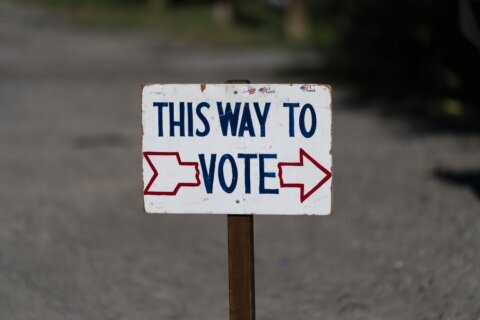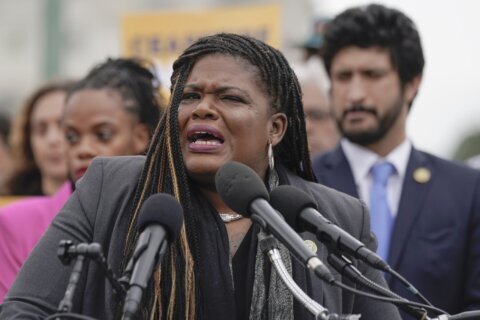WASHINGTON (AP) — As California’s attorney general, Kamala Harris successfully defended the death penalty in court, despite her past crusade against it.
As a new senator, she proposed abolishing cash bail — a reversal from when she chided San Francisco judges for making it “cheaper” to commit crimes by setting bail amounts too low.
And now, as vice president and the Democratic presidential nominee, Harris’ campaign insists she does not want to ban fracking, an oil and gas extraction process, even though that was precisely her position just a few years ago during a brief White House bid.
Politicians often recalibrate in the face of shifting public opinions. Across two decades in office and now seeking the presidency for a second time, Harris has not hesitated to stake out expedient and — at times — contradictory positions. Her policy reversals are opening her to attacks by Republicans and testing the strength of her pitch to voters as a truth-teller who is more credible than former President Donald Trump.
“She is vulnerable to the charge of flip-flopping, no question about that,” said John Pitney, a professor of political science at Claremont McKenna College in California. “The trouble for Republicans, to put it lightly,” is Trump and his running mate, Sen. JD Vance of Ohio, “do not come to this issue with spotless records.”
Harris’ campaign did not address her policy shifts and instead leaned into her credentials as a prosecutor to attack Trump.
“During her career in law enforcement, Kamala Harris was a pragmatic prosecutor who successfully took on predators, fraudsters, and cheaters like Donald Trump,” said spokesman James Singer.
Trump has changed positions, too
Trump has a well-documented record of falsehoods, shifting positions and outright lies. One of the clearest examples of Trump taking all sides of an issue is on the subject of abortion. He was “very pro-choice” in 1999 but later declared he was “pro-life” roughly a decade later and suggested during his 2016 presidential campaign that women who have abortions should be subject to “some form of punishment.”
Nevertheless, there is ample incentive to attack Harris along similar lines if history is a guide.
Republicans in 2004 savaged then-Sen. John Kerry for voting both for and against the same Iraq War funding bill, arguing he lacked core principles. Democrats attacked George H.W. Bush for failing to abide by his “read my lips” vow to not raise taxes.
But it hasn’t always worked. In 1992, Democratic presidential hopeful Paul Tsongas attacked Bill Clinton, dismissing him as someone who “will say anything, do anything to get votes.” Clinton won the presidency twice.
The death penalty
One of Harris’ most pronounced shifts was over the death penalty, which she pledged to never pursue when elected San Francisco district attorney.
She stuck to that pledge when a 21-year-old gang member was accused of killing a police officer — a decision condemned by rank-and-file cops and some fellow Democrats.
Harris softened her approach four years later as she campaigned for California attorney general. Amid a tightly contested race, Harris said she would ”enforce the death penalty as the law dictates.” Other Democrats on the ballot cruised to victory; Harris barely won.
Her office successfully defended the death penalty in court and Harris argued she was obligated to uphold the law as the state’s top attorney — even as she refused to enforce a referendum that banned gay marriage.
‘Blood and guts prosecutor’ turned progressive
As district attorney, Harris zealously approached criminal enforcement matters. She pursued the parents of chronically truant students, sought higher bail amounts and aggressively prosecuted drug crimes.
“She was a blood and guts prosecutor,” said Bill Fazio, a longtime San Francisco attorney who ran against Harris in the 2003 district attorney’s race.
As attorney general, Harris continued to take hardline stances. She appealed convictions that judges had ordered thrown out. Her office fought the ordered release of prisoners due to overcrowding. She also opposed legislation requiring her office to investigate shootings involving police and declined to back statewide standards for the use of body cameras.
Once elected to the Senate in 2016, however, Harris jettisoned many of those positions. She portrayed herself as a “progressive prosecutor” and proposed sweeping reforms, including abolishing the cash bail system and a moratorium on the death penalty.
It’s unclear if Harris still supports the idea. Her campaign declined to directly address the question.
“She believes that we need a system where public safety, not wealth, determines who should stay behind bars following an arrest. Anyone who is a danger to society should be detained regardless of how wealthy,” said Singer, the spokesman.
‘I did inhale’
Harris also changed positions on two other hot-button issues: marijuana and gun control.
Most Americans live in states where marijuana is legal in some form, and Harris is now the first major party presidential nominee to support marijuana legalization.
Her prosecutors in San Francisco, however, convicted more than 1,900 people on cannabis-related offenses and she opposed allowing marijuana sales for recreational use when running for California attorney general in 2010, arguing it would cause confusion in the state’s loosely regulated medicinal marketplace.
She maintained the position when running for re-election to the office — but her Republican challenger didn’t.
By the time she sought the presidency in 2019, she had reversed course and joked that as a college student she “did inhale,” twisting a line Bill Clinton used in his 1992 campaign to deflect criticism that he had used the drug.
Most American adults support legalization, so “it’s not surprising that any particular politician also would,” said Morgan Fox, political director for the National Organization for the Reform of Marijuana Laws.
Harris supported mandatory gun buy-back programs during her short-lived campaign for the presidency in 2019. But since becoming vice president, she has pulled back support for the idea, which would force millions of gun owners to sell their AR-15s and similar firearms to the government.
She now advocates for more moderate and politically popular proposals, including universal background checks on gun sales and “red flag” laws.
___
Blood reported from Los Angeles and Suderman reported from Richmond, Virginia.
Copyright © 2024 The Associated Press. All rights reserved. This material may not be published, broadcast, written or redistributed.







